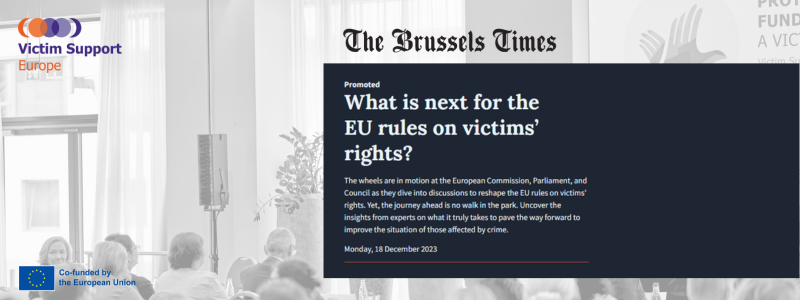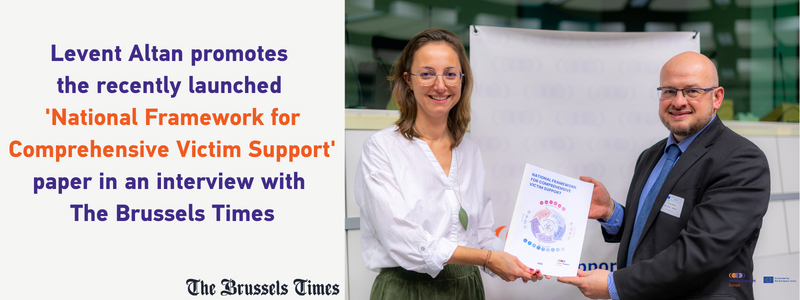Strengthening the Anti-Trafficking Directive: A Plea for Comprehensive Victim Support

As a strong advocate for the rights and well-being of victims of crime, I find myself compelled to voice both appreciation and concern regarding the ongoing revision of the Anti-Trafficking Directive (2011/36/EU) by the European Commission. Over the past decades, substantial progress has been made in international and European policies, with the adoption of crucial legislations such as Directive 2011/36/EU and the 2012 Victims’ Rights Directive, which provides a minimum set of rights benefitting all victims of all crimes. Yet, as we stand in the advanced revision stage of these directives, there remains an urgent need to address the evolving challenges faced by victims of human trafficking.
Let me be clear – Victim Support Europe (VSE) welcomes the Commission’s commitment to amend the Anti-Trafficking Directive and its proposal for revision. We fully support the necessity of adapting EU rules to combat human trafficking and protect its victims continually. However, our enthusiasm is tempered by the realisation that, while the proposed amendments address emerging challenges like the digitalisation of trafficking, they fall short in strengthening the protection and assistance afforded to victims.
One of the key areas where the proposed revisions miss the mark is in the provisions related to assistance and support to victim of human trafficking (Article 11of the Anti-Trafficking Directive). Gaps persist in the provision of vital support services across EU countries, ranging from the absence of specialised victim support services to inadequacies in accessible and high-quality assistance. The need for comprehensive coordination and harmonised National Referral Mechanisms (NRMs) cannot be overstated. While the inclusion of Member States’ obligation to establish NRMs is a step in the right direction, inconsistencies persist in their implementation, leading to varied levels of identification, support and protection for victims. This creates inequalities for victims, depending on the Member State they are in.
Access to information and translation/interpretation, a fundamental right for all victims, demands special attention in the context of human trafficking. The cross-border nature of this crime amplifies the barriers faced by victims, including language hurdles and unfamiliarity with national justice systems. The proposed revisions must address these challenges head-on, ensuring that victims of trafficking have unimpeded access to simple and accessible information and are able to actively and safely participate in justice processes.
Legal aid, a cornerstone of victim’s ability to exercise their rights and participate in justice processes, also requires to be strengthened. Due to the nature of the crime, and of the exploitation, human trafficking severely impacts all areas of victims’ lives, who must often undergo numerous legal procedures. The right to legal aid, guaranteed under the 2012 Victims’ Rights Directive, must be extended for victims of trafficking without cost, beyond criminal proceedings to cover all legal procedures related to a person’s victim status, including civil, labour, immigration, and asylum proceedings. This expansion is critical to overcoming obstacles in accessing justice for presumed trafficked persons.
Training emerges as a fundamental tool in early victim identification and respectful treatment. While the 2011 Anti-Trafficking Directive encourages Member States to ‘promote regular training,’ VSE contends that further harmonisation is needed to define the focus and frequency of these programmes. Specialised training, tailored to the unique needs of victims of human trafficking, is essential for creating a consistent approach across the EU and for the long-term implementation of victim-sensitive approaches.
As the EU finalises discussions on the revised Anti-Trafficking Directive, we must ensure the inclusion of clear provisions on the independence of National Rapporteurs or equivalent mechanisms. Transparency, oversight, and independence are crucial for the successful implementation of anti-trafficking policies across Member States.
We recognise that some of these changes can be achieved both through strengthening the Anti-Trafficking Directive but also through the Victims’ Rights Directive, which is currently being revised and which provides a strong set of rights for all victims of all crimes. The EU should identify which barriers met by THB victims, as well as which solutions that could help THB victims, are common to other groups and see whether opportunities can be developed through the VRD, thereby strengthening this piece of legislation as a solid foundation for all victims of crime.
As someone who has dedicated their efforts to championing the cause of victims, I implore the European institutions to seize this opportunity to strengthen the Anti-Trafficking Directive. Let us not only combat trafficking effectively but also ensure the comprehensive protection and support of those we aim to safeguard. The road ahead is clear – let us pave it with empathy, resilience, and an unwavering commitment to justice for all victims of human trafficking.
Recommend0 recommendationsPublished in Opinion


